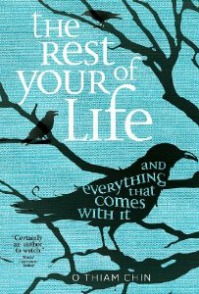|
by Abigail Cheung

O Thiam Chin, The Rest of Your Life and Everything that Comes with It, ZI Publications, 2011. 163 pgs.
O Thiam Chin's third collection of short stories—The Rest of Your Life and Everything that Comes with It—develops the author's reputation as an expert excavator of life's rawest emotions from characters that, on the surface, lead banal lives. Three qualities in particular make this collection noteworthy: the emotional precision with which O writes about a variety of human experiences, the incisiveness with which he depicts the darker sides of human nature and the way he unifies twelve disparate stories. These skills, combined with his economic writing style, do much to explain why his work is quickly generating acclaim. O deals directly with dark and dangerous topics—topics other writers would avoid—and places them in the heart of Singaporean society: Ang Mo Kio. Although all the stories in The Rest of Your Life explore taboo themes, each piece tugs at our emotions in a slightly different way. The collection explores sadomasochism, lust, rape, abandonment, murder and guilt. However, O's characters—including a bored housewife, a resentful sister and an unwitting teenager—are sufficiently complex to ensure that the stories never descend into gratuitous exploitations of human suffering. O opens his collection with "Yellow Elephant," a fantastical tale about a recently separated paralegal whose encounter with a golden elephant in her cramped flat takes a surprisingly violent turn. While the story's use of magical realism may make it a risky choice to open the collection, the risk pays off as "Yellow Elephant" fully showcases O's talent for extracting deep emotions from unexpected places. The story begins with a middle-aged paralegal returning home from work to find two things: a pathetic, one-line note from her husband announcing that he has left her and a yellow elephant. While the plot and conceit are improbable, the protagonist's reaction to the great beast is even more surprising. Initially, O contrasts the woman's reaction to the letter with her response to her unexpected visitor. Whereas the husband's note incites anger in the protagonist, the animal elicits her loving care and attention. At first, the elephant's mesmerizing yellow skin distracts the woman from the pain of her failed marriage. She fetches the animal a large bowl of water "suddenly, as if remembering her manners toward a neglected guest" and cares for it "as if it were a newborn baby." After her first day with the yellow pachyderm, she sleeps "soundly…not caring whose side of the bed it was now that her husband had disappeared" and dreams of the elephant's "soulful eyes which contained everything ever known to man." Her maternal instincts are short-lived, however. As time passes, the elephant's voracious appetite, unwieldy size and destructive nature grow increasingly intolerable. Frustrated that the enormous creature has encroached on her physical and psychological space, the wife switches coping mechanisms and quietly plots to murder the elephant. As O delineates her savage actions—she first tricks the beast into drinking poisoned water, then slaughters it and finally rips out and devours its heart—her primal nature becomes manifest. At the same time, this scene reveals the full effect of O's writing and leaves the reader with a twisted, masochistic sense of having experienced the previously unimaginable. Yet O also leaves room for the imagination. After the paralegal viciously tears into the elephant's heart, the story ends abruptly, and the reader is left to contemplate the husband's fate—if the paralegal is willing to murder the elephant, how will she react the next time she meets her husband? The end of the story also provides a strong sense of foreboding about the woman's own fate when her skin turns the same yellow hue as the elephant's. If the elephant's skin colour initially attracted the wife-cum-murderer to the animal, the transformation of her own skin colour suggests she may share its fate. Fundamentally, "Yellow Elephant" is a story about mourning and grief. While other pieces in The Rest of Your Life—notably "Sleeping" and "The Good Husband"—deal with similar themes, the collection manages to stir an impressive range of emotions in the reader. For instance, in "Good Job," O elicits a sense of discomfort in several scenes in which a young student is violently raped by his boss during a summer job. In "Where Are You Hiding?," the author questions the limits of a mother's love by describing the difficulty she faces interacting with her son after learning he has murdered a neighbour. In "Patchwork," O highlights the tension between remembering the past and moving forward in a woman's decision to destroy, rather than hang, a family heirloom. While the effect of O's writing is sometimes uncomfortable, it is also memorable. His mastery of emotional detail leaves a lasting, and often haunting, impression. |